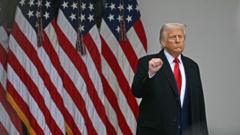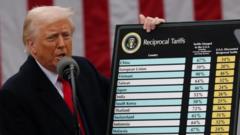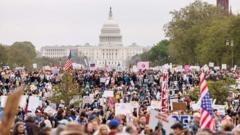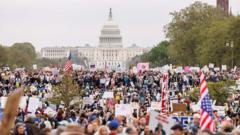As President Trump's tariffs on US imports roll out, the stock market reacts negatively, and his broader policy initiatives face challenges from both political opposition and legal battles.
Trump's Tariff Strategy Hits Economic and Political Snags

Trump's Tariff Strategy Hits Economic and Political Snags
A new wave of tariffs sparks turmoil in US markets and raises concerns over Trump's second-term agenda.
Donald Trump proudly proclaimed April 2 as "liberation day" with the announcement of sweeping new tariffs on US imports, but the fallout has been immediate and severe. The stock market experienced significant turmoil following the revelation of his trade policies, signaling that the president's aspirations for his second term may clash with stark economic realities.
Major indices fell sharply, responding to fears that key trading partners, including Canada, the EU, and China, are gearing up for retaliation against the new measures. Despite the backlash, Trump remains optimistic, pledging that his vision for revitalizing American manufacturing through protectionist tariffs will ultimately succeed. His administration is now mounting defenses against what could become a protracted trade war.
In the face of potential protests against his policies, the mood around the White House is tense. Security preparations are underway for anticipated demonstrations, and the First Lady has postponed a scheduled garden tour out of safety concerns. Media interactions have been limited, with fewer administration officials available to discuss the unfolding situation.
Beyond trade, Trump's foreign policy agenda has encountered significant hurdles this week. His high-profile goals of resolving conflicts in Gaza and Ukraine are now bogged down by escalating violence and complex negotiations. Reports indicate that the ceasefire discussions Trump heralded pre-inauguration are crumbling, particularly with Israel intensifying its military operations and Russia eviscerating hopes for a decisive peace with Ukraine.
Legal challenges also loom over Trump's enforcement of immigration policies. Court rulings are complicating his administration’s efforts to deport certain groups while upholding other measures, such as suspending asylum processing. This legal pushback may jeopardize long-hoped-for accomplishments on immigration reform.
Meanwhile, significant elections in Wisconsin and Florida highlighted a potential shift in voter sentiment. Democrats have managed to hold critical seats and may be gaining traction in areas previously regarded as Republican strongholds. Republicans have been confronting a dilemma as figures like Senator Ted Cruz publicly acknowledge that Trump's tariffs could have detrimental effects on American jobs if retaliatory measures escalate.
Crisis within the party is beginning to emerge as some members express concern over the ramifications of Trump's continuing policies. Consequently, if current economic instability persists and the overall damage to state services becomes evident, Republican lawmakers may find themselves distancing from the president.
For now, as Trump presses forward with his agenda, he remains undeterred by immediate political fallout, believing firmly that his approach will ultimately lead to widespread economic prosperity. However, in politics, the challenges of reality can often prove to be insurmountable.






















